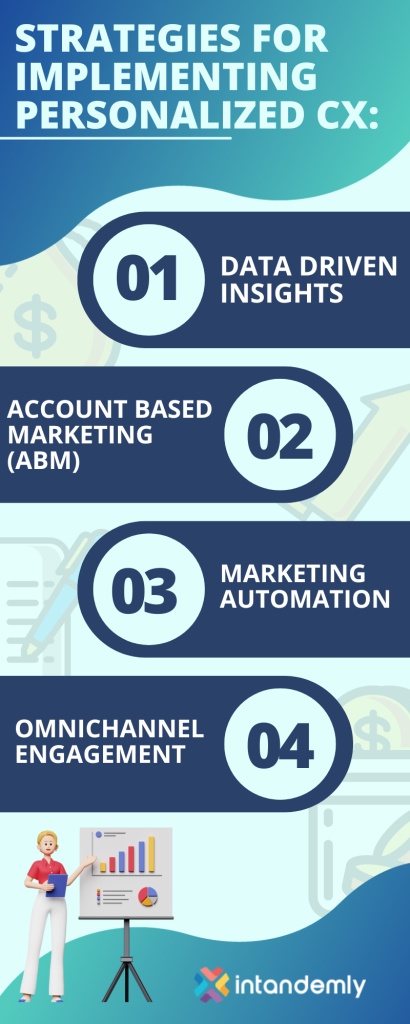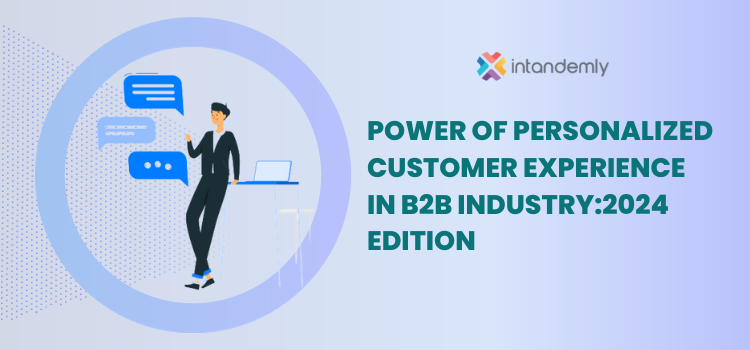Power of Personalized Customer Experience in B2B Industry – 2024 Edition
Introduction:
The B2B industry is undergoing rapid transformations, driven by technological advancements and changing business dynamics. As companies strive to stay ahead of the competition and meet the demands of the digital age, understanding the latest market insights becomes crucial.
In this blog post, we will explore a trending B2B industry market insight that can help businesses thrive in today's fast-paced environment: the rise of personalized customer experiences.
Why Personalized CX Matters in B2B?
In the B2B space, the customer experience has traditionally taken a backseat to other factors such as pricing, product quality, and delivery speed. However, as the line between B2B and B2C continues to blur, customers now expect the same level of personalization and seamless experiences in their business interactions as they do in their personal lives.
According to a recent study by Evergage, 80% of B2B buyers are more likely to purchase from a company that offers personalized experiences. This statistic underscores the growing significance of customization and tailored interactions in the B2B industry. By focusing on delivering personalized customer experiences, businesses can differentiate themselves from competitors and drive growth.
In the B2B space the decision-making processes are often complex and involve multiple stakeholders, personalized CX plays a crucial role in building trust, fostering loyalty, and driving growth. Here are some compelling reasons why personalized CX is essential for B2B success:
- Enhanced Relevance: Personalized Customer experience ensures that marketing messages, product recommendations, and support interactions are relevant to the individual customer's needs and interests. This increases engagement and reduces the likelihood of customers feeling overwhelmed or ignored.
- Improved Customer Satisfaction: When customers feel understood and valued, their satisfaction levels naturally rise. Personalized CX fosters positive experiences that lead to increased customer retention and advocacy.
- Strengthened Customer Relationships: Personalized Customer experience builds stronger relationships between businesses and their customers. By demonstrating genuine care and attention, businesses can establish trust and loyalty, which are essential for long-term success.
- Data-Driven Insights: Personalized Custonmer experience relies on collecting and analyzing customer data to gain valuable insights into their preferences, behaviors, and pain points. These insights can be used to refine marketing campaigns, enhance product offerings, and improve customer service.
- Increased Conversion Rates: By delivering tailored messaging and relevant content, businesses can increase their conversion rates. Personalization helps move prospects through the sales funnel more effectively by addressing their specific pain points and demonstrating how products or services can meet their unique needs.
- Improved Brand Perception: Companies that invest in personalized experiences are perceived as customer-centric and forward-thinking. This positive brand perception can differentiate businesses from competitors and attract new customers
Key Strategies for Implementing Personalized CX:
To effectively implement personalized CX strategies in B2B, businesses need to adopt a data-driven approach, utilizing customer insights to tailor interactions and offerings. Here are some key strategies to consider:

- Data-driven Insights: Leveraging data analytics and customer insights is key to delivering personalized experiences. By collecting and analyzing data from various touchpoints, businesses can gain valuable insights into customer preferences, pain points, and buying patterns. This data can be used to tailor marketing messages, refine product offerings, and personalize customer interactions.
- Account-Based Marketing (ABM): ABM is a strategic approach that targets high-value accounts with personalized marketing campaigns. By aligning marketing and sales efforts, businesses can create customized experiences tailored to specific accounts or decision-makers within those accounts. ABM allows for personalized messaging, relevant content, and targeted outreach, increasing the chances of success.
- Marketing Automation: Automation tools enable businesses to scale personalization efforts efficiently. By automating repetitive tasks such as email marketing, lead nurturing, and content distribution, companies can deliver personalized experiences at scale. Marketing automation platforms use data and customer behavior triggers to deliver the right message to the right person at the right time, boosting engagement and conversions.
- Omnichannel Engagement: B2B customers engage with brands across multiple channels, both online and offline. To deliver consistent personalized experiences, businesses must adopt an omnichannel approach. This involves integrating all customer touchpoints, including websites, social media, email, mobile apps, and in-person interactions. By providing a seamless experience across channels, companies can build stronger relationships and increase customer loyalty.
Avoid These Pitfalls in Delivering Personalized Customer Experiences
While personalized customer experiences can drive significant benefits for B2B businesses, it's important to be aware of potential pitfalls and avoid them. Here are some key things to avoid when implementing personalized customer experiences:
- Overlooking Privacy Concerns: Personalization relies on customer data, but it's crucial to handle that data with care. Avoid collecting excessive or unnecessary customer information and ensure compliance with data protection regulations, such as GDPR or CCPA. Be transparent about data usage and give customers control over their personal information.
- Lack of Relevance: Personalization should be meaningful and relevant to the customer. Avoid generic or superficial personalization attempts that don't address the specific needs or preferences of the individual. Invest in data analysis to gain deep insights and deliver truly tailored experiences.
- Inconsistent Messaging: Inconsistency across different touchpoints can undermine personalized experiences. Ensure that messaging and communication are aligned across various channels, such as email, website, social media, and in-person interactions. Inconsistency can confuse customers and erode trust in the brand.
- Relying Solely on Technology: While technology plays a crucial role in delivering personalized experiences, it's important not to rely solely on automation and algorithms. Remember the human element. Personalization should be a blend of technology and human touch, where empathy and genuine customer understanding are valued.
Examples of Personalized Customer Experince in B2B
Personalized CX can be implemented in various ways across the B2B customer journey. Here are some examples:
- Content Personalization: Tailor website content, email newsletters, and social media posts based on customer interests and past interactions.
- Product Recommendations: Recommend products or services based on customer purchase history, browsing behavior, and industry trends.
- Predictive Analytics: Utilize predictive analytics to anticipate customer needs and proactively offer solutions or support.
- Account-Based Marketing (ABM): Implement ABM strategies to target and personalize marketing efforts towards high-value accounts.
- Personalized Customer Service: Provide personalized support interactions that address individual customer needs and preferences.
- Chatbots and AI-Powered Assistants: Chatbots and AI-powered assistants can provide personalized customer support, answering questions and resolving issues in real-time.
Personalized Customer Experience
Personalized customer experience is not just a trend; it's a fundamental shift in how businesses interact with their customers. By embracing personalized CX, B2B companies can differentiate themselves, strengthen customer relationships, and achieve sustainable growth in the competitive years to come.
Conclusion:
As the B2B industry continues to evolve, prioritizing personalized customer experiences is becoming increasingly vital for sustained success. By leveraging data-driven insights, implementing account-based marketing strategies, adopting marketing automation, and embracing omnichannel engagement, businesses can unlock growth opportunities and strengthen their competitive edge. Embracing the power of personalization enables companies to build stronger customer relationships, drive conversions, and elevate their brand in the B2B marketplace.






![Content Marketing Trends-2024 [Comprehensive Guide]](https://www.intandemly.com/wp-content/uploads/2016/07/content-marketing-blog-banner-50x50.png)


Pingback: B2B Prospecting: Emerging Trends - Prospecter